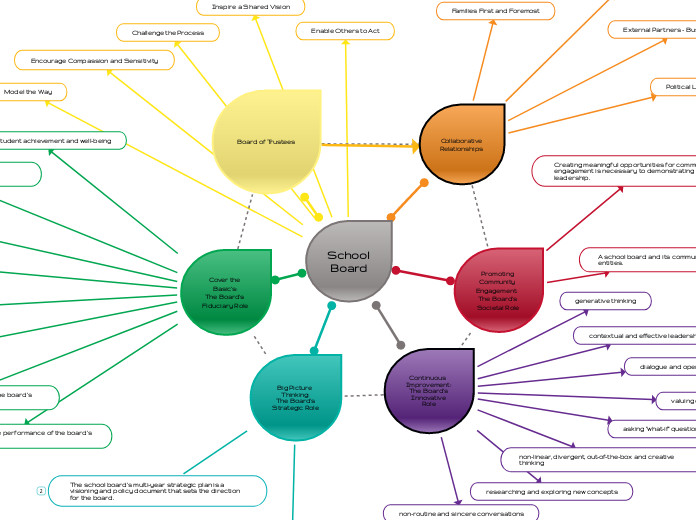School
Board
Board of Trustees
Collaborative
Relationships
Families First and Foremost
Other Levels of Local Government and Community Agencies
External Partners - Business Leaders
Political Leaders
Big Picture
Thinking:
The Board's
Strategic Role
The school board's multi-year strategic plan is a visioning and policy document that sets the direction for the board.
A strong multi-year plan is a driver for positive change in the board.
Cover the
Basic's:
The Board's
Fiduciary Role
- promote student achievement and well-being
- ensure effective stewardship of the board's resources
- deliver effective and appropriate education programs to its pupils
- develop and maintain policies and organizational structure that, promote the board's goals and encourage pupils to pursue their educational goals
- monitor and evaluate the effectiveness of policies developed by the board in achieving the board's goals and efficiency of the implementation of those policies
- develop a multi-year plan aimed at achieving the board's goals
- annually review the mutli-year plan with the board's director
- monitor and evaluate the performance of the board's director of education
Promoting
Community
Engagement:
The Board's
Societal Role
A school board and its communities are not isolated entities.
School boards are linked to the lives of families.
School boards are linked to the local community and to the parallel organizations that form that community.
School boards are connected to the provincial government, the nation and the world at large.
Creating meaningful opportunities for community engagement is necessary to demonstrating ethical leadership.
- amplify community voice.
- amplify the voice of historically marginalized communities
- ensure processes for community voice to inform board decision making
Continuous
Improvement:
The Board's
Innovative
Role
generative thinking
researching and exploring new concepts
valuing diversity
contextual and effective leadership
dialogue and openness
asking "what-if" questions
non-linear, divergent, out-of-the-box and creative thinking
non-routine and sincere conversations
